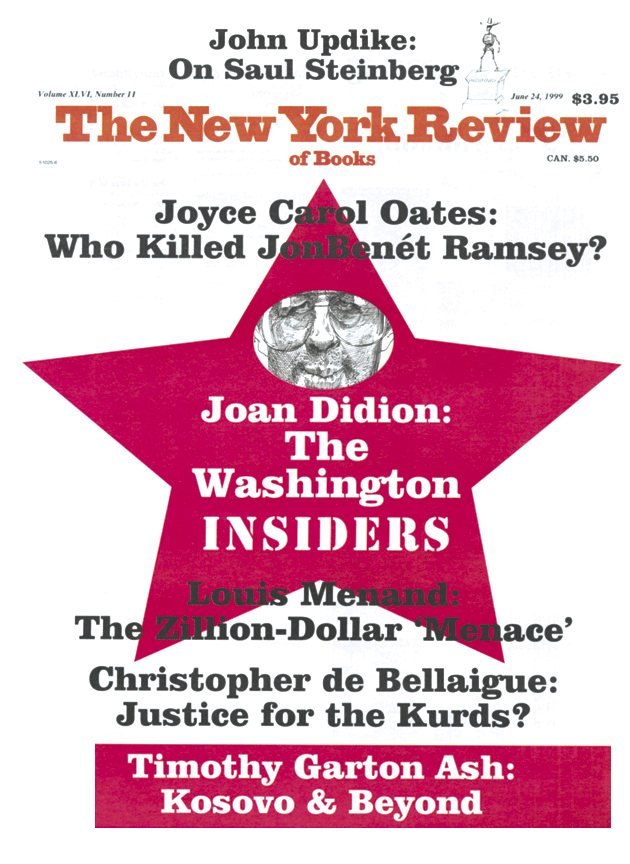In response to:
Chopping Down the Sacred Tree from the April 22, 1999 issue
To the Editors:
Allow me to defend Dr. Johnson, who is implied to be a racist or imperialist in Larry McMurtry’s review of James Wilson’s The Earth Shall Weep: A History of Native America [NYR, April 22]. McMurtry suggests that Johnson would have sided with the white oppressors of the Cherokees.
Yet all his life Johnson was a vehement supporter of the underdog at home and abroad. In current coinage, he was a “compassionate conservative.” This noble declaration of Johnson says it all: “Where a great proportion of the people are suffered to languish in helpless misery, the country must be ill policed and wretchedly governed: a decent provision for the poor is the true test of civilization.”1
Johnson hated the English oppression of the Irish. Boswell says, “He had great compassion for the miseries and distresses of the Irish nation, particularly the Papists; and severely reprobated the barbarous, debilitating policy of the British government.” In Johnson’s own words, “Let the authority of the English government perish, rather than be maintained by iniquity.”2
Johnson hated slavery. Of American hypocrisy he said, “How is it that we hear the loudest yelps for liberty among the drivers of Negroes?” And of the British West Indies planters, “Here’s to the next insurrection of the Negroes in the West Indies.”3
Johnson never accepted that European and American conquests of native peoples were justified by any superiority of race or civilization—unlike that greatest of all persecutors of the Cherokees, the Democrat Andrew Jackson.
Lawrence Ladin
President, The Aspen Writers’ Foundation
Aspen, Colorado
Larry McMurtry: replies:
In reviewing it’s usually the asides that get one into trouble—vagrant opinions uttered or muttered as much from instinct as thought.
In this case I’m grateful to Mr. Ladin for requiring me to think again about Dr. Johnson and Onitositah (or Corn Tassel), whose stirring rejection of the Anglo-European embrace I quoted. Why didn’t I think Dr. Johnson would be on Corn Tassel’s side?
For an answer Iwould have to reach back to a time long ago when, for some two years, I amused myself by reading Boswell’s Life in the stately six-volume edition done by George Birbeck Hill, books in which the great text flows sluggishly through a swamp of argument and exegesis. Because Rousseau was in vogue Boswell (or sometimes Garrick) now and then goad Johnson on the subject of savages, trying to get him to admit that there might be, if not nobility, at least some virtue in primitive custom. Johnson won’t have it; he expresses only scorn. Of a woman, presumably white, who had to be bound and forcibly pulled back from savage to civilized life Boswell allows that she must have been an animal, a beast. “Sir, she was a speaking cat,” Dr. Johnson says. On another occasion he reckons that the savage’s sensitivity is not above ours, but below it, “like bears.”
There are two dozen such references in the amply indexed Birbeck Hill edition—no doubt some fading memory of them led me to remark that Dr. Johnson would not have been on Corn Tassel’s side.
Mr. Ladin is right to suggest that Dr. Johnson would have supported Corn Tassel in his resentment and resistance to the land-grab that was underway, but I still doubt that he would have approved of the well-spoken Cherokee’s firm rejection of Anglo-European law and custom.
No doubt this is Boswell’s fault. There are many good books about Johnson, books which clean him up a bit, give him a bib. Maybe the pesky Mrs. Thrale prodded him into writing the irritable late polemics, of which few nowadays approve. But there is still only one great book about him, Boswell’s, in which the Tory Johnson is seen in all his glorious crankiness and complex greatness, and it was that Johnson I was thinking about when Islipped in my aside.
This Issue
June 24, 1999


